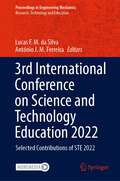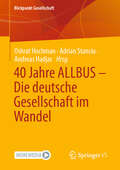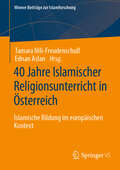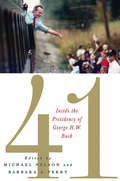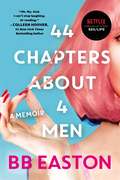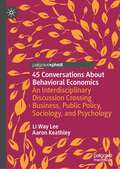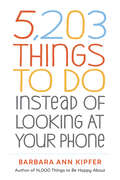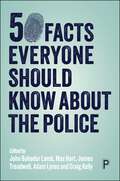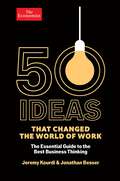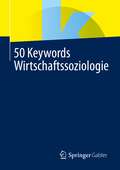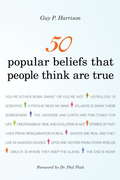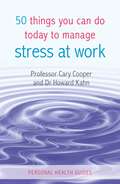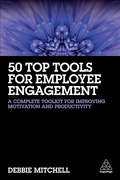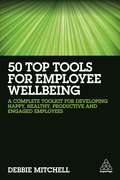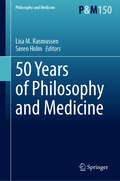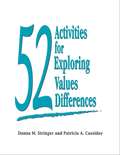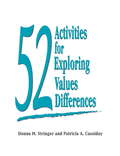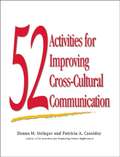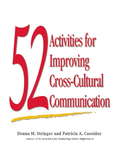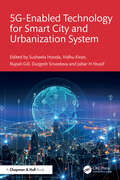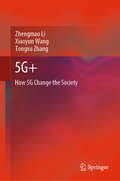- Table View
- List View
3rd B.A. Sociology Study Of Social Problems Course-4 Block1-4 - KSOU
by Karnataka State Open UniversityThe textbook titled "Study of Social Problems" (Course-4) is part of the 3rd Year B.A. Sociology curriculum offered by Karnataka State Open University (KSOU), Mukthagangotri, Mysore. Designed for English medium students, the textbook spans Blocks 1 to 4 and provides a comprehensive overview of key social issues affecting Indian society today. Topics likely include poverty, unemployment, crime, gender inequality, caste discrimination, substance abuse, and environmental challenges. Through a sociological lens, students are encouraged to critically examine the causes, consequences, and potential solutions to these problems. The content is structured to support academic learning and is also a valuable resource for aspirants preparing for competitive exams such as the UGC-NET in Sociology. With a blend of theoretical perspectives and real-world case studies, the book aims to equip students with analytical tools and a deeper understanding of contemporary social realities.
3rd International Conference on Science and Technology Education 2022: Selected Contributions of STE 2022 (Proceedings in Engineering Mechanics)
by Lucas F. M. da Silva António J. M. FerreiraThis volume of the series Proceedings in Engineering Mechanics - Research, Technology and Education provides selected papers presented at the 3rd International Conference on Science and Technology Education, held in Porto, Portugal, October 6-7, 2022. From the various topics covered at this conference, individual contributions have been selected for this book. These contributions focus on learning mechanisms, learning systems and assessment. The book presents the latest trends, new methods and ideas in science and technology education. An essential resource for lecturers and tutors working in this field.
40 Jahre ALLBUS - Die deutsche Gesellschaft im Wandel (Blickpunkt Gesellschaft)
by Oshrat Hochman Andreas Hadjar Adrian StanciuDie Allgemeine Bevölkerungsumfrage der Sozialwissenschaften, kurz ALLBUS, erhebt seit 1980 Daten über die deutsche Bevölkerung und bietet somit eine zentrale Infrastruktur für die Sozialwissenschaften sowie die Sozialberichterstattung. Anhand des strikten Replikationseinsatzes der Frageprogramme und der Erhebungsmethoden sowie seiner hohen Qualitätsansprüche lässt sich durch den ALLBUS der soziale Wandel in Deutschland über 40 Jahre beobachten. Neben der Standarddemographie werden imRahmen des ALLBUS die Einstellungen der deutschen Bevölkerung zu Ungleichheit, Migration, Religion, Politik und weiteren Themen erhoben. Im Jahr 2020 feierte der ALLBUS sein 40-jähriges Jubiläum. Wegen der Pandemie konnten wir diesen wichtigen Meilenstein nur online feiern und zwar mit eine Ringvorlesung, in der Forscherinnen und Forscher ihre Forschung mit den ALLBUS-Daten präsentierten. Dieses Buch bietet einen Einblick in einige Beiträge der Ringvorlesung, die die langen Zeitreihen desALLBUS und somit seinen wertvollsten Schatz genutzt haben, um sozialwissenschaftlichen Fragen nachzugehen. Das Buch beleuchtet unterschiedliche gesellschaftliche Entwicklungen, die sich über die Zeit mit den ALLBUS-Daten beobachten lassen. Auf der einen Seite bietet das Buch Forschungsergebnisse zu Bildungsvorstellungen in Deutschland, zu der Entwicklung der Einkommenslage in unterschiedlichen familialen Lebensformen und zu religiösem Wandel in Deutschland. Auf der anderen Seite setzen sich unsere Autorinnen und Autoren mit den Einstellungen der deutschen Bevölkerung zur Berufstätigkeit der Frau, zu Migration, Politik und zu Demokratie auseinander. Eine besondere methodologische Herausforderung bei der Analyse langer Zeitreihen ist die Korrelation zwischen Alter, Kohorte und Periode. Sind zum Beispiel Unterschiede in den Einstellungen das Ergebnis bestimmter Ereignisse, die nur ein Teil der Befragten miterlebt hatte? Oder zeichnet sich hiermit die Schere zwischen jüngeren und älterenMenschen ab? Und wie kann man das überhaupt voneinander trennen? Einige Autorinnen und Autoren schlagen hierfür unterschiedliche Herangehensweisen vorund diskutieren deren Vor- und Nachteile. Eine weitere Herausforderung betrifft die Frage, inwiefern die gleichen analytischen Konstrukte die gleichen theoretischen Konzepte über die Zeit messen. Diese Frage ist zunächst inhaltlicher Natur, denn es geht in erste Linie darum, ob die Bedeutung bestimmter Begriffe über die Zeit stabil bleiben oder nicht. Des Weiteren stellt diese Frage auch eine methodologische Hürde dar, denn sollte die Bedeutung nicht stabil bleiben, kann man die Beziehungen zwischen solchenKonstrukten schwer über die Zeit vergleichen. Auch diese Herausforderung wird von einige Autorinnen und Autoren adressiert. Mit diesem Band der Buchreihe ‚Blickpunkt Gesellschaft‘ feiern wir das 40-jährige ALLBUS-Jubiläum. Dabei stellen wir zentrale gesellschaftliche und methodologische Fragen, die mit den ALLBUS-Daten gut beantwortet werden können.
40 Jahre Islamischer Religionsunterricht in Österreich: Islamische Bildung im europäischen Kontext (Wiener Beiträge zur Islamforschung)
by Ednan Aslan Tamara Nili-FreudenschußÖsterreich war eines der ersten westeuropäischen Länder, das den Islam als Körperschaft öffentlichen Rechts anerkannt hat. Diese historische Anerkennung geht zurück auf die lange, facettenreiche Geschichte des Islam in Österreich und erfüllte den Muslim*innen in Österreich einen lang gehegten Wunsch, welcher auch in vielen anderen europäischen Ländern besteht. Seit 40 Jahren ermöglicht diese Anerkennung den Muslim*innen, den Islam als ordentliches Unterrichtsfach an öffentlichen Schulen zu unterrichten. Die Erkenntnisse aus dieser langjährigen Erfahrung im Bereich des islamischen Religionsunterrichts sind von großer Bedeutung für andere europäische Staaten, die sich ebenfalls um die Integration des islamischen Religionsunterrichts in das öffentliche Schulwesen bemühen. Der Band bietet einen umfassenden Überblick aus religionspädagogischer und -didaktischer, gesellschafts- und bildungspolitischer, rechtlicher und empirischer Perspektive. Er beleuchtet die 40-jährige Geschichte des islamischen Religionsunterrichts in Österreich und zeigt auf, welchen Beitrag religiöse Bildung zur Integration muslimischer Kinder in die Gesellschaft leisten kann.
41
by Michael Nelson Barbara A. PerryBoth history and current events attest to the continued significance of religion in society. Yet despite the role and importance of the institution of religion, and the profound influence that religious organizations continue to exert, religion occupies a curiously marginal place in organization theory. At the same time, organization theory has been criticized for its narrow focus on corporations, and there have been calls to study a much broader range of organizational forms (e. g. , Bamberger and Pratt, 2010). Interestingly, the small number of studies of religious organizations that have been published have had a disproportionate impact on the field. This suggests that religious organizations deserve more attention, and that attending to them will have significant benefits for our understanding of organizations. This volume brings together leading organizations theorists with an interest in religion to take stock of recent developments as well as introduce new ways of thinking about the relationship between religion and organization.
44 Chapters About 4 Men
by BB EastonOne woman's secret journal completely changes her marriage in this hilarious and biting memoir -- soon to be a Netflix Original Series.School psychologists aren't supposed to write books about sex. Doing so would be considered "unethical" and "a fireable offense." Lucky for you, ethics was never my strong suit.44 Chapters About 4 Men is a laugh-out-loud funny and brutally honest look at female sexuality, as told through the razor-sharp lens of domesticated bad girl BB Easton. No one and nothing is off limits as BB revisits the ex-boyfriends -- a sadistic tattoo artist, a punk rock parolee, and a heavy metal bass player -- that led her to finally find true love with a straight-laced, drop-dead-gorgeous...accountant.After settling down and starting a family with her perfectly vanilla "husbot," Ken, BB finds herself longing for the reckless passion she had in her youth. She begins to write about these escapades in a secret journal, just for fun, but when Ken starts to act out the words on the pages, BB realizes that she might have stumbled upon the holy grail of behavior modification techniques. The psychological dance that ensues is nothing short of hilarious as BB wields her journal like a blowtorch, trying to light a fire under her cold, distant partner. Sometimes it works, sometimes it doesn't, but in the end, BB learns that the man she was trying so hard to change was perfect for her all along.
45 Conversations About Behavioral Economics: An Interdisciplinary Discussion Crossing Business, Public Policy, Sociology, and Psychology
by Li Way Lee Aaron KeathleyThe hallmark of this book is its conversational format. The conversations are organic: no jargons, no additives such as equations and tables. Each conversation comes in bite-size, taking no more than ten minutes to digest.
5,203 Things to Do Instead of Looking at Your Phone
by Barbara Ann KipferBecause life is calling. Put down your phone, close the lid on your laptop, and get back in touch with the wonders of the world around you. With thousands of ideas for simple, beautiful things to do instead of scrolling down the rabbit hole of cyberspace, this healing little book offers the opportunity, 5,203 times, to slow down, look up, and rediscover what makes you feel nourished and grounded as a human being. With illustrations throughout by Scot Ritchie.
50 Facts Everyone Should Know About the Police: Criminal Investigation and Policing in England and Wales
by John Bahadur Lamb, Max Hart, James Treadwell, Adam Lynes and Craig KellyHave you ever wondered whether crime dramas reflect the reality of police work? Or what the future of policing could look like in the context of recent controversies? Offering thought-provoking insights into understanding, addressing and preventing crime, this fascinating 'go to' book reveals the myths and realities of policing in the 21st century. The 50 facts take in crime prevention, the investigative process, forensics, models of policing, the limits of police powers and a range of other provocative themes. Offering a deeper and richer understanding of the profession, this book will equip you to think critically about modern perceptions of policing.
50 Ideas that Changed the World of Work
by Jeremy Kourdi Jonathan BesserFifty key ideas that have changed the way we think about why we behave the way we do while at work. The world of work is full of ideas. Some of these ideas shape the work we do and the way we do it. But it can often be hard to sort the wheat from the chaff. When ideas really do break new ground and change the way we think about what we do, they can help all of us to be better, happier, and more productive. The trick is to know which ones offer the most reliable vision, and how they can be adapted and deployed to the best effect. By encapsulating and explaining the best of this thinking, 50 Ideas that Changed the World of Work is equal parts vision and road map; an invaluable and insightful guide to navigating the world of work today.
50 Keywords Wirtschaftssoziologie
by Springer Fachmedien WiesbadenVon Arbeit über Industriesoziologie bis zu Zukunftskompetenzen: Begriffe aus dem Bereich der Wirtschaftssoziologie sind zahlreich und häufig zum Thema Europa zeichnen sich durch unzählige Fachtermini und Abkürzungen aus. Das vorliegende Nachschlagewerk eignet sich für den ersten schnellen Überblick. In 50 übersichtlichen Schlüsselbegriffen werden unter anderem grundlegende Konzepte, Theorien und Teilaspekte der Wirtschaftssoziologie erläutert. Die Erklärungen sind kompakt und verständlich formuliert. Sie bieten Basiswissen für alle, die einen schnellen Einstieg in das Thema suchen, einzelne Begriffe nachschlagen oder ihr vorhandenes Wissen auffrischen möchten.
50 Popular Beliefs That People Think Are True
by Guy P. HarrisonStressing the excitement of scientific discovery and the legitimate mysteries and wonder inherent in reality, this book invites readers to share the joys of rational thinking and the skeptical approach to evaluating our extraordinary world. Maybe you know someone who swears by the reliability of psychics or who is in regular contact with angels. Or perhaps you're trying to find a nice way of dissuading someone from wasting money on a homeopathy cure. Or you met someone at a party who insisted the Holocaust never happened or that no one ever walked on the moon. How do you find a gently persuasive way of steering people away from unfounded beliefs, bogus cures, conspiracy theories, and the like? This down-to-earth, entertaining exploration of commonly held extraordinary claims will help you set the record straight. This veteran journalist has not only surveyed a vast body of literature, but has also interviewed leading scientists, explored "the most haunted house in America," frolicked in the inviting waters of the Bermuda Triangle, and even talked to a "contrite Roswell alien." It is not out simply to debunk unfounded beliefs. Wherever possible, he presents alternative scientific explanations, which in most cases are even more fascinating than the wildest speculation. For example, stories about UFOs and alien abductions lack good evidence, but science gives us plenty of reasons to keep exploring outer space for evidence that life exists elsewhere in the vast universe. The proof for Bigfoot or the Loch Ness Monster may be nonexistent, but scientists are regularly discovering new species, some of which are truly stranger than fiction.
50 Things You Can Do Today to Manage Stress (Personal Health Guides)
by Wendy GreenIn this reassuring and easy-to-follow book, find out 50 things you can do to help you manage stress, such as identifying your stress triggers and learning how to manage them, choosing beneficial foods and supplements, and reducing stress through aromatherapy and therapeutic massage.
50 Things You Can Do Today to Manage Stress (Personal Health Guides)
by Wendy GreenIn this reassuring and easy-to-follow book, find out 50 things you can do to help you manage stress, such as identifying your stress triggers and learning how to manage them, choosing beneficial foods and supplements, and reducing stress through aromatherapy and therapeutic massage.
50 Things You Can Do Today to Manage Stress at Work (Personal Health Guides)
by Cary Cooper Howard KahnIn this easy-to-follow book, Professor Cary Cooper and Dr Howard Kahn guide you through the steps you can take to manage and control stress in the workplace. This book helps you to understand what stress is and identify how and why it occurs at work, and offers practical advice to help you make positive changes.
50 Things You Can Do Today to Manage Stress at Work (Personal Health Guides)
by Cary Cooper Howard KahnIn this easy-to-follow book, Professor Cary Cooper and Dr Howard Kahn guide you through the steps you can take to manage and control stress in the workplace. This book helps you to understand what stress is and identify how and why it occurs at work, and offers practical advice to help you make positive changes.
50 Top Tools for Employee Engagement: A Complete Toolkit for Improving Motivation and Productivity
by Debbie MitchellEngaged employees are more productive, motivated and resilient, yet gaining financial support to develop engagement is harder than ever as budgets are being squeezed and everyone is being asked to do more with less. 50 Top Tools for Employee Engagement shows that you don't need expensive interventions or additional resource to achieve employee engagement. It contains practical tools which can be used to make an immediate difference to engagement, whether you're working with individuals, teams or the organization as a whole. Each tool in 50 Top Tools for Employee Engagement includes guidance on when to use it, how long it will take and useful hints and tips to help get the most out of it. Most importantly, this book will give guidance on how to measure the impact of each tool to show what's working and where efforts are best focused. Addressing all the key areas of engagement throughout the employee life cycle, from talent attraction and induction to career progression and development, this book is a complete resource to engaging your workforce.
50 Top Tools for Employee Wellbeing: A Complete Toolkit for Developing Happy, Healthy, Productive and Engaged Employees
by Debbie MitchellIn a world of political and economic uncertainty where stress and unhappiness are on the rise, improving employee wellbeing has never been more important. But with budgets being squeezed and the constant need to do more with less, this can seem like an insurmountable task. 50 Top Tools for Employee Wellbeing shows that interventions don't need to be expensive or time-consuming. It contains practical tools for immediately improving staff wellbeing, resulting in happier, more engaged and more productive employees. Each tool in the book includes guidance on when to use it, how to get the most out of it and - most importantly - how to measure its impact to show what's working and where efforts are best focused. Addressing all the key areas of the subject, from career development and workplace culture to physical, mental and financial wellbeing, this is a complete resource for improving your workforce's wellbeing.
50 Years of Philosophy and Medicine (Philosophy and Medicine #150)
by Lisa M. Rasmussen Søren HolmThis volume celebrates the history of the Philosophy and Medicine series with a retrospective assessment of the impact of the series over 50 years, written by some who were involved from the beginning, and others who have been influenced by the series. The Philosophy of Medicine book series was founded in 1975, inspired by remarkable new technologies that challenged our understanding of medicine’s abilities and purpose. These technologies raised challenges that required deeper conceptual analysis and the tools of philosophy to address. Since its inception, the series has published 150 volumes addressing topics from assisted reproduction to end-of-life care; the history of medical ethics; international approaches to philosophy and medicine; clinical ethics and clinical judgment; brain death; and more. A must-read for anyone specializing in or interested in philosophy of medicine.
52 Activities for Exploring Values Differences
by Donna M. Stringer Patricia A CassidayFinally, an entire manual of activities devoted to values exploration. The authors have written and adapted sound, ready-to-use activities for settings where the exploration of value differences would be beneficial: the workplace, the classroom, human resources programs, ESL classes, corporate diversity training and others. With 52 different learning exercises focusing on how people lead and work together, this book discusses the work styles that make the difference in your organization.
52 Activities for Exploring Values Differences
by Donna M. Stringer Patricia A. CassidayIn 52 Activities for Exploring Values Differences, Donna Stringer and Patricia Cassiday have written and adapted sounds, ready-to-use activities for settings where the exploration of values differences is beneficial: the workplace, the classroom, corporate diversity training, international team development workshops, conflict management and others. The activities cover a broad spectrum for the varied needs of trainers and teachers: those who like hands-on, practical but low-risk activities; those who prefer experimental activities; and those who learn best if they can reflect on ideas. The authors' "Classification of Activities" at the front of the book helps users choose activities that are appropriate for their needs according to risk level, time required, context (work, personal or general) and group (individual, team, organization, domestic diversity or multinational). The directions for the activities are easy to follow, and the worksheets and handouts can be photocopied for use.
52 Activities for Improving Cross-Cultural Communication
by Donna M. Stringer Patricia A CassidayThe exercises in this book are intended to facilitate effective communication across a wide range of differences. Many of the exercises are written with instructions that address needs for a specific audience (e.g., gender or generation). Stringer and Cassiday have written and adapted sound, ready-to-use activities for settings where the exploration of cross-cultural communication would be beneficial: the workplace, the classroom, human resources programs, ESL classes, corporate diversity training, international team development workshops, conflict management and others.
52 Activities for Improving Cross-Cultural Communication
by Donna M. Stringer Patricia A. CassidayCommunication styles and patterns differ vastly among people from different cultures. Every culture has a "communication style norm" and when that style mixes with another, stereotypes and misperceptions arise. 52 Activities for Improving Cross-Cultural Communication explores cross-cultural communication issues with an eye toward increasing understanding and effectiveness. 52 Activities for Improving Cross-Cultural Communication is a practical trainer's manual that includes applications from many sectors, such as business, diversity, cross-cultural fields, and from many trainers in the U.S., Europe, Asia, the Middle East and Latin America. Exercises are organized according to audience, time required to perform and the risk level for participants, a unique feature created by the authors, and are easily adaptable to the user's particular need and situation. Many of the exercises are written with instructions that address requirements for a specific audience (e.g., gender or generation). There is something for everyone: those who like hands-on, practical activities; those who prefer experiential exercises; and those who learn best through reflection.
5G Enabled Technology for Smart City and Urbanization System
by Susheela Hooda Durgesh Srivastava Jabar H. Yousif Vidhu Kiran Rupali GillThis book examines the applications, trends and challenges of 5G Enabled technologies for Smart City and Urbanization systems. It addresses the challenges to bringing such capabilities of 5G-enabled technologies for smart cities and urbanisation into practice by presenting the theoretical as well as technical research outcomes with case studies. It covers key areas, including smart building, smart health care, smart mobility, smart living, smart surveillance, and IOT-based systems. It explains how these systems are connected using different technologies that support 5G access and control protocols.• Offers a comprehensive understanding of the emergence of 5G technology and its integration with IoT, Big Data, and Artificial Intelligence for smart city and urbanisation• Focuses on useful applications of Smart City and Urbanization, which can enhance different aspects of urban life• Explores the advantages of using massive IoT and predictive analytics approaches in smart cities• IoT, Bigdata, Deep learning and machine learning techniques are explained to fuel smart city and Urbanization system• Addresses both theoretical and technical research outcomes related to smart city and urbanisation with 5G technology.It serves as a valuable reference for graduate students, researchers, and m practitioners seeking to deepen their knowledge and engage with the latest advancements in the areas of Smart cities and Urbanization systems.
5G+: How 5G Change the Society
by Zhengmao Li Xiaoyun Wang Tongxu ZhangThis book takes China Mobile's "5G +" plan as the mainline, introduces three major scenarios, nine indicators, system architecture and basic principles of 5G, and systematically explains the essence of China Mobile's "5G +" for the first time. A lot of industry use cases and solutions are introduced for 5G to bring new changes to life, industries, and social governance. This book can benefit all readers who are interested in 5G. It also can be a reference for vertical industry partners to fully understand the possible applications of 5G. Most of all, it will help to promote all industries with new developments based on 5G's new kinetic energy.

